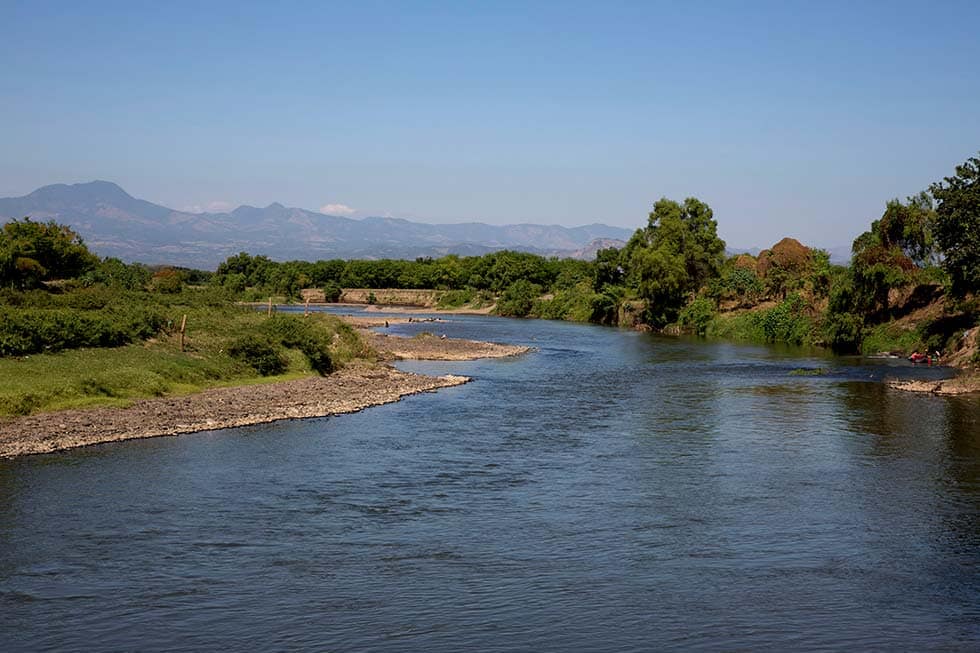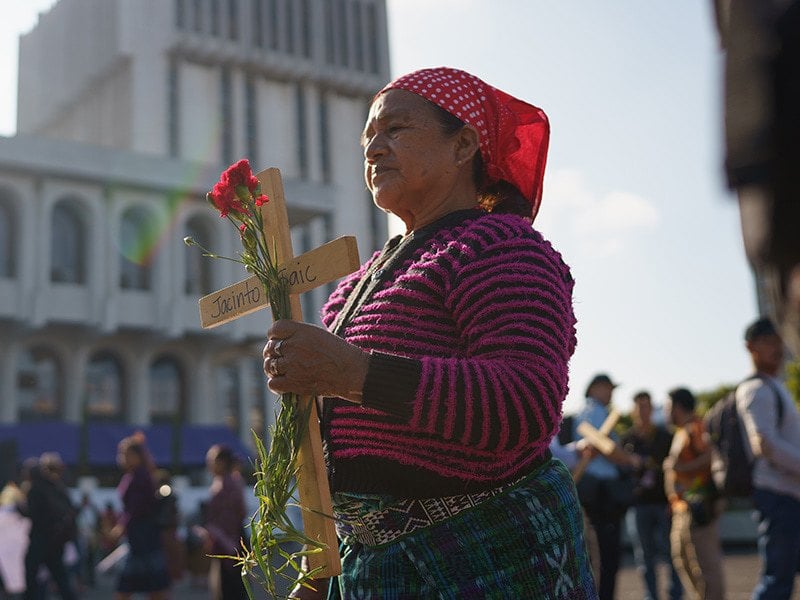Meet AJWS Grantees in Latin America & The Caribbean!
Our Work Across the Region

Dominican Republic
In the Dominican Republic, AJWS supports civil and political rights organizations of Haitian migrants and Dominicans of Haitian descent, who have been pushed to the fringes of society for decades. Many members of the latter community were thrust into statelessness in 2014 when the supreme court retroactively stripped them of their nationality — thereby severing their access to education, employment and healthcare. AJWS supports the country’s leading Haitian-descendant activists to defend the rights of their community, including advocating for legal solutions to end state sponsored statelessness, fighting xenophobic and racist application of laws, helping families access basic services, and strengthening their community’s sense of self-worth in a society that has stigmatized and demeaned them for generations.
AJWS also funds feminist organizations that fight for the rights of adolescent girls, young and adult women, LGBTQI+ people and sex workers — building social movements to reduce inequality, confront gender-based violence, advance racial justice and reshape Dominicans’ deeply patriarchal values. We enable our partners to build community agency, directly advocating for improved access to services; we also support activists to access mental health services to help cope with the emotional toll of the persecution and obstacles they face.


Focus Issues:
Civil and Political Rights, Humanitarian Response, Sexual Health and Rights
Grantees:
29
Funded by AJWS since:
2000

Focus Issues:
Civil and Political Rights, Humanitarian Response, Sexual Health and Rights
Grantees:
29
Funded by AJWS since:
2000

El Salvador
In El Salvador, AJWS supports activists tackling environmental degradation, escalating climate crises, the extreme criminalization of abortion, and oppression of LGBTQI+ people and sex workers. In a hostile environment where the government is increasingly cracking down on human rights activism, AJWS supports intrepid grassroots climate justice organizations to be frontline defenders of their communities against mining, water privatization, and large-scale farming that endanger rural people’s lives and livelihoods. AJWS brings these organizations together to collaborate and build vibrant social movements that engage the public over critical issues like the human right to water.
AJWS also supports LGBTQI+ people, human rights defenders, and sex workers, all of whom face obstacles to accessing health care, education and other critical services. We stand behind activists leading the fight for reproductive justice, as abortion remains strictly outlawed in El Salvador. As sex workers and LGBTQI+ people experience violations from police and other government officials with impunity, AJWS supports activists working to stop abuses, create safe, healthy communities, cut down negative social stigmas, and help people support themselves with sustainable livelihoods.




Guatemala
In the years following a civil war and genocide that spanned nearly four decades, Guatemala has struggled to grow into a thriving democracy. There is strong collusion between the economic elites, retired military and organized crime, who have maintained their power with impunity. And social movements pushing for greater respect for democratic institutions have been criminalized by the government. In this challenging environment, AJWS supports Guatemalans to fight for their right to political expression and association. We accompany organizations helping communities affected by the Guatemalan genocide to fight for justice, and work to lift up the voices of women, youth and Indigenous People within Guatemala’s growing movements for change.
As the climate crisis causes increasingly severe natural disasters in Guatemala, AJWS also supports Indigenous and peasant communities in rural areas to defend their territories against the construction of hydroelectric dams, pipelines and monocrops. Our grantees also work with communities to fight against the rampant expansion of palm oil plantations, which have deforested vast swaths of land, diverted precious water, and caused forced evictions of Indigenous and peasant families.


Focus Issues:
Civil and Political Rights, Humanitarian Response, Land, Water and Climate Justice
Grantees:
22
Funded by AJWS since:
1992

Focus Issues:
Civil and Political Rights, Humanitarian Response, Land, Water and Climate Justice
Grantees:
22
Funded by AJWS since:
1992

Haiti
For much of its modern history, Haiti has endured crisis after crisis. In recent years, these include several massive earthquakes, widespread flooding, the collapse of the government and takeover by violent gangs — all in quick succession. In response, AJWS funds activists attempting to rebuild a stronger, more democratic and less exploitive country for all. AJWS is a key supporter of Haitian-led efforts to create a credible transition government that can lead Haiti to free and fair elections, so the country can be rebuilt with leaders representing the will of the people. We also support rural communities to resist the takeover of their farmlands by private industries for extractive projects like gold mining.
We proudly count some of Haiti’s most influential civil and land rights defenders and pro-democracy activists among our grantees, and help these activists access international platforms and create wide-reaching movements to spread their messages. AJWS supports all of our partners with flexible funding, allowing them to pivot and respond when a new crisis strikes. So, while many seek to find a solution to Haiti’s governance crisis, they are also able to meet the emergency needs of their community when a natural disaster — like an earthquake, flood or hurricane— creates a calamity for vulnerable communities across the island.


Focus Issues:
Civil and Political Rights, Humanitarian Response, Land, Water and Climate Justice
Grantees:
30
Funded by AJWS since:
1990

Focus Issues:
Civil and Political Rights, Humanitarian Response, Land, Water and Climate Justice
Grantees:
30
Funded by AJWS since:
1990

Mexico
In Mexico, AJWS supports collectives of family members searching for their disappeared loved ones and Indigenous-led organizations fighting for their communities’ rights for self-determination. Since 2006, when the so-called ‘war on drugs’ started, Mexico has been consumed with a wave of violence, a product of a complex combination of the expansion of drug cartels, corrupt officials and widespread militarization. More than 110,000 people have been disappeared, and the crisis has left thousands of families searching for answers. AJWS supports collectives of these families in their search to find their missing loved ones and pursue truth and justice. They are building a powerful, national movement of families fighting for an end to impunity and inclusion in decision-making about solutions to the disappearance crisis.
AJWS also supports Indigenous organizations and coalitions that advocate for the rights of the 23+ million Indigenous Peoples from 68 officially recognized ethnic groups in Mexico. Our grantees use legal strategies to ensure that affected Indigenous communities have an active role in approving any proposed infrastructure or energy project on their territories. Corn is also an integral part of Indigenous identities, and partner organizations work to conserve heirloom corn and stop the expansion of GMO seeds in the Mexican countryside by promoting seed exchanges and seed banks, and advocating in national and international policy spaces to regulate GMO crops.


Focus Issues:
Civil and Political Rights, Humanitarian Response, Land, Water and Climate Justice
Grantees:
31
Funded by AJWS since:
1988

Focus Issues:
Civil and Political Rights, Humanitarian Response, Land, Water and Climate Justice
Grantees:
31
Funded by AJWS since:
1988

Nicaragua
The past two centuries in Nicaragua have been marked by turbulent power struggles, as various forces violently vied for power in the wake of Independence from Spain. Contemporary Nicaragua is rife with severe economic and social inequality, a deeply patriarchal culture and the authoritarian aspirations of President Daniel Ortega, who has dismantled the country’s remaining democratic institutions. In 2018, a movement of thousands of students, farmers, feminists and more took to the streets demanding an end of Ortega’s dictatorship, but government forces violently suppressed the coalition. Peaceful protestors were murdered and civil and political leaders imprisoned for speaking out, but the people’s desire for freedom and democracy persists.
In this environment, where defending human rights comes with great risk, AJWS supports courageous activists who continue to raise their voices, defending the rights of women, LGBTQI+ people, Indigenous communities and others who suffer oppression at the hands of the Ortega regime. We support grantees advocating for the human rights of marginalized Nicaraguans in order to create a more just and democratic society for all.


Focus Issues:
Civil and Political Rights, Humanitarian Response, Sexual Health and Rights
Grantees:
32
Funded by AJWS since:
1998

Focus Issues:
Civil and Political Rights, Humanitarian Response, Sexual Health and Rights
Grantees:
32
Funded by AJWS since:
1998



